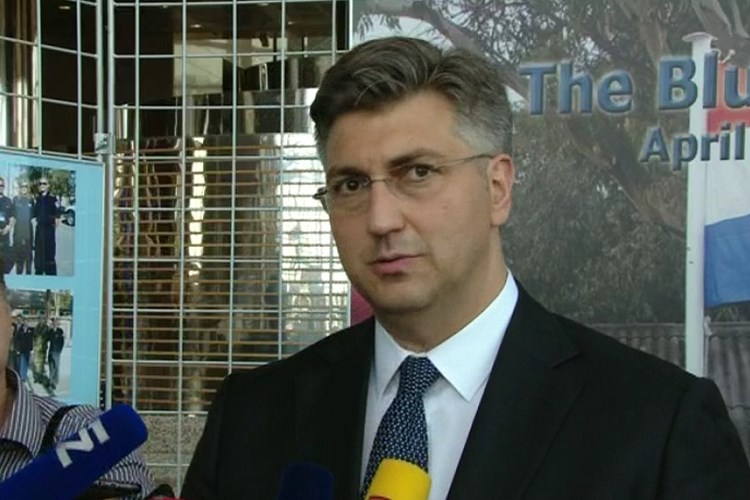- Published: 22.05.2017.
PM: EC recommendation confirms Croatia on right track
Prime Minister Andrej Plenkovic on Monday assessed that the recommendation by the European Commission for Croatia to exit the Excessive Deficit Procedure (EDP) confirmed that Croatia is on the right track and that the recommendations that the Commission made are similar to the government's thoughts.
"A responsible fiscal policy, wise budget management and, naturally, GDP growth, reduced public debt and very good results with regard to an all-time low budget deficit of just 0.8% of GDP, have brought us to the position for the European Commission to recommend that Croatia exit the Excessive Deficit Procedure, which we were in for several years. That is confirmation that the government, the economy minister, the finance minister have done their job well and yet another proof that Croatia is on the right track," Plenkovic said at a ceremony on the occasion of the 25th anniversary of Croatia's membership of the United Nations.
The prime minister expects the Council of Ministers of the EU to confirm the decision for Croatia to exit the EDP in mid-June.
The European Commission on Monday gave Croatia five recommendations which are nearly identical to those from last year, referring to public finance and taxation, pensions, the labour market and social welfare, salaries, public administration and state companies, and the services sector and the judiciary.
"Of course there are recommendations. In the context of the European Semester, one is closely looking at how Croatia prepared its National Reform Programme, what the priorities are, what is expected of us, and that is to continue with structural reforms. I think that the recommendations by the Commission are in line with our thinking, which is good for implementing the government's programme and which is good in any case for consolidating our public finances," Plenkovic said.
Asked whether this is one of the reasons why he is 'resisting' the possibility of a snap parliamentary election, Plenkovic said that he was not resisting anything but considers that political stability is essential for Croatia's economy.
"I am not resisting anything but the main reason for my political involvement was a message of political stability and that Croatia needs stability to enable economic growth and development," he said.
He commented on an announcement earlier in the day that disgruntled suppliers would stop delivering goods to Agrokor if their demands concerning promissory notes were not met by 29 May.
Plenkovic said that the demands would be considered to see whether a legal explanation of the Lex Agrokor was necessary concerning the emergency administration, but that he was sure the law itself was in the interest of suppliers.
"I am certain that the situation today is much better for all suppliers, after the law was adopted and activated, compared to the previous situation, when they would have faced bankruptcy, not just Agrokor and the companies within the group but many suppliers too," he said.
He reiterated that he considers that the law marked a turnabout in doing business in Croatia and underscored that the most important thing now is that goods delivered after April 10 are paid for "within the deadlines set between Agrokor and its suppliers."
"If there is any uncertainty, I am sure that it can be resolved with suppliers through dialogue," he added.
Asked if a possible stoppage of goods being delivered to Agrokor would mean the entire story surrounding Lex Agrokor would cave in, Plenkovic said that he expected just the opposite and recalled that the process meant that the accounts of some of them were unblocked.
"Nothing will cave in, just the opposite. With this law we created a firm process that we are managing. The restructuring process will last 12 to 15 months and I expect suppliers to cooperate. It is a fact that some suppliers who have been paid after creditors injected fresh liquidity have settled their entire receivables, which meant that their accounts could be unblocked, yet they are now the most articulated in these demands. The Croatian government is looking at the wider interest and the wider process and is trying the solve the problems, from the smallest family farms to large suppliers," Plenkovic concluded.
Text: Hina
